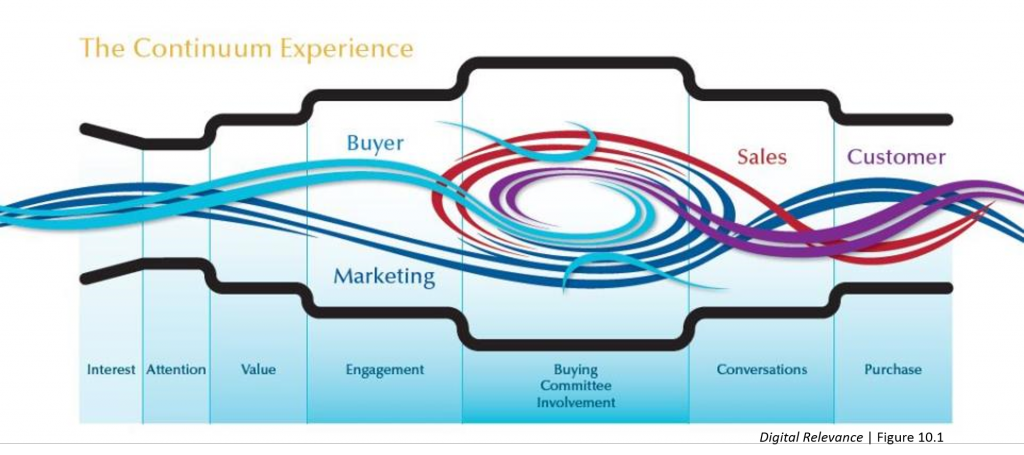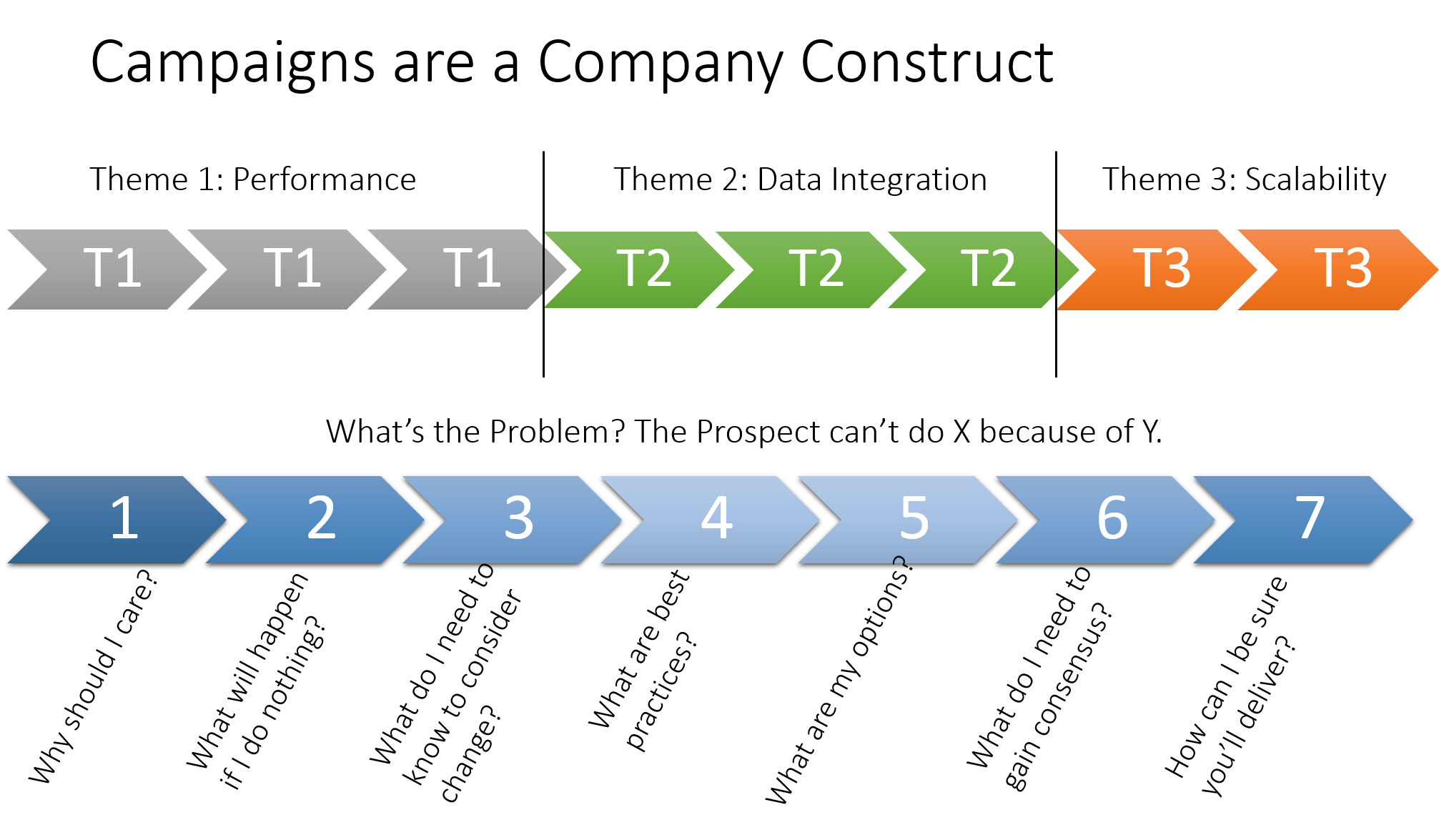Please take sharp aim and pull the trigger! Shoot it right between the eyes of the inevitable self-serving sales follow-up to schedule a demo that arrives shortly after the campaign ends. If you don’t, every time a campaign that your audience is interested in ends, you halt momentum in its tracks and give them the opportunity to decide that you’re no longer relevant. As soon as they catch on and see that the topic they were interested was replaced by another, that’s just what happens.
After spending all that time, effort and resource to create engagement in a topic of interest, why would you purposefully kill it off because the construct of campaign says it has a stop date? Great way to suck the life out of buyer engagement!
Your Buyers Never Asked For Campaigns
Campaigns are a company construct that companies created to box in marketing programs under the belief that this would provide a valid way to measure marketing efforts. We needed to make marketing programs fit within the reporting schedules our companies expected – quarterly, if not monthly. So we devised a formula that included #X touches followed by a sales call to try and show that marketing was more than a fluff machine.
Marketers like campaigns because they provide a vehicle for a change of scenery. Heck, by the time a campaign ends, we’re sick of it. We’ve seen the content a bunch of times. We feel like we’ve been talking about the same thing forever. We’re outright bored. We get engaged again as we plan our next campaign. Something new and exciting for us. A new topic. New creative. New content. And another chance to beat our last metrics for clicks, form completions and “leads” generated. Do you see where the focus is?
Campaigns worked pretty well until the last five to seven years because before information was freely accessible companies had the information monopoly. But, here’s the problem. Buyers have the power. But campaigns still exist. Pretty much the way they always have. I’m the recipient of a number of them. I can almost predict when they’ll end and when the sales follow-up will come.
Perhaps it’s because we’ve lost focus about what a campaign represents in the context of the buyer. But it’s also because we tend to look at them from the inside. When what can make a difference is understanding both the inside and outside of a buyer experience.
If you can prove to me that your buyers actually have told you that they want 3 touches and a sales call, I’ll stop. But I really don’t think you can.
Kill the Campaign: Go After the Continuum
So I want to ask you to think about how much more meaning and purpose you can create for buyers if you focus on a content marketing strategy that spans the continuum of both the buying process and customer life cycle. One continuous, relevant, highly interesting storyline or stream of content that matches needs and context at every point or stage. Make these 3 strategic pivots for more compelling experiences.
The figure above is one of the core subjects I discuss in my book, Digital Relevance. Essentially, the continuum overlays your sales process as the buyer’s experience. By focusing on a continuous story or conversation, you can actually build a relationship with your buyers based on meaning and value – from their perspective.
The continuum will help to keep you on track with the context of your buyers at each point in the development of their willingness to embrace changing their status quo. And, by doing so your company will be invited into the conversations needed to for them to make that final choice / purchase decision. This is possible when you take a buyer-driven qualification approach.
As you can see in the continuum experience graphic above, buyers (influencers, decision makers and end users) will come in and out of the experience. As will sales. But marketing is the storyteller throughout. Addressing the continuum results in a consistent and progressive experience for your buyers throughout the process, not just when they get lucky that your campaign addresses the problem that’s high on their priority list.
It takes this level of focus to establish authority for a problem-to-solution journey. Trust will ebb and flow based on the relevance of every campaign. But with a well constructed continuum, trust will be established and continue to grow and flourish because the expertise you share is always on point. It’s about moving beyond marketing theatre to establish continuum experiences.
Take a look at the difference between campaigns and a continuum approach:
I could go on, but I’ll stop here. What’s your vote? Will you kill the campaign? Or will you continue to use the company construct, rather than what will have higher relevance for your buyers across the entirety of the buying process?


Yes Ardath, Kill the Campaign. I agree 110% that it is an internal structure that doesn’t add value for prospects.
That said, I’m not sure that I’m fully buying into the solution you propose here. Your recommendation is about an individual and how we keep them engaged. Paraphrasing: we need to always be relevant to them, from initial discovery of our perspective or solution to hopefully their advocacy for us to others.
Executing across the continuum, as you call it, has to start somewhere. The campaign has its roots in acquisition, which often starts the process. While I don’t believe the answer is a “campaign” I do think we need to reframe that initial acquisition through the lens of relevance to the customer, without meaningful history to build that perfect experience around.
Hmmm, this just might inspire a post. I’m definitely overdue for one. 🙂
Hi Eric,
Thanks for chiming in! I’m getting on a plane and a response requires more time than I have now, but in response to your comment about acquisition, how we view that definition can be a big contributor to why campaigns don’t work well for those on the receiving end. It’s about what we want more than what they want.
This is a great topic. I read a lot about campaigns and the value of it and every time I do I get confused. Why is there so much misconception form what a campaign actually is..?
Campaigns are for marketers. Not for customers. At least that’s my point of view. A marketer needs something to hold on to. Something that can be managed and measured. It has a clear start with goals and an end with results.
Campaigns are a great framework. And that’s what it is. When a prospect gets the feeling they are part of a campaign then the marketer is taking the wrong angle. Then it probably is all about achieving the marketers goals.
When a campaign is set up based on the needs of the prospect you have a recipe for success.
Aldo (Amsterdam)
We have made the switch from campaigns towards continuous marketing services during the last two years. It was quite a change (and a difficult one) but it was worth it. We have continuous growth for ourself and our clients instead of the high (and expensive) spikes generated by outbound media advertising. So I complete agree with you.
That’s excellent to hear. Congrats on your success!